Edition 5/August 2024 The South African Association of Hospital and Institutional Pharmacists (SAAHIP) 37th Annual Conference and 68th Annual General Meeting (AGM) to be held on the 10 – 13 April 2025 Presents “FUTURE READY 5.0” Empowering Hospital Pharmacists for Tomorrow’s Healthcare Revolution CALL FOR ABSTRACTS The South African Association of Hospital and Institutional Pharmacists Southern Gauteng branch is excited to announce a call for abstracts for our upcoming conference focused on exploring the intersection of hospital and institutional pharmacy and the fifth industrial revolution during the implementation of the NHI bill in South Africa. As the healthcare landscape evolves rapidly, propelled by advancements in technology and innovation, it is crucial to understand how these changes will shape the future of pharmacy practice within not only the hospital pharmacy setting, but within the broader pharmacy landscape. This conference aims to explore the dynamic landscape of healthcare in the midst of the fifth industrial revolution and equip hospital pharmacists with the knowledge and tools necessary to thrive in this transformative era. BACKGROUND We are currently in the 4th Industrial Revolution, where advances in technology affect the way we work, play, and think. But how are these innovations in technology affecting the field of hospital pharmacy and are we keeping up with it or is it merely passing us by? What is the future of pharmacy in the age of technology and innovation? This is an opportunity for us as pharmacists to display our efforts within our workplace in keeping up with technology and innovation. The Fifth industrial revolution will be upon us soon. It is often referred to as the “Cognitive Age” and is a transformational point in history. We need to redefine our human existence. This is the era where we harmonise machine intelligence and human interaction for the improvement of humanity. Let us display the human interactions that pharmacists provide as we harmonise with technology. “5.0” in our theme topic directly refers to the Fifth Industrial Revolution. NATIONAL HEALTH INSURANCE On the 15th May 2024, President Cyril Ramaphosa signed the National Health Insurance Bill into law. What does this mean for hospital pharmacy? …/ continued on page 3 The Golden Mortar 5/2024 1

1-5 SAAHIP Abstracts 5 Conference & AGM Notice 8 - 9. Codeine Revisited 6. Pharmacy Month Pamphlet 7. Pharmacy Month Poster 9 FIP World Congress 10. SAAPI Training Workshops Information 11. SAAPII in Partnership with Syenza 12. Faculty of Health Science Prize-Giving Ceremony 2. PSSA SG Branch CPD Webinar 13 PSSA Book Department Indemnity Insurance 14. Museum Artefacts 15. PSSA SG Branch Symposium 14 SAACP Webpage Information SAVE THE DATE The Southern Gauteng Branch of PSSA in collaboration with SAACP Southern Gauteng Branch cordially invites you to attend a CPD Webinar Topic Integrating African Traditional Medicine SPEAKER: Ms. Zelna Booth DATE: 20 August 2024 TIME: 19h00 VENUE: Microsoft Teams: Join the meeting now Meeting ID: 367 375 432 074 Passcode: KPvCap The Golden Mortar 5/2024 2
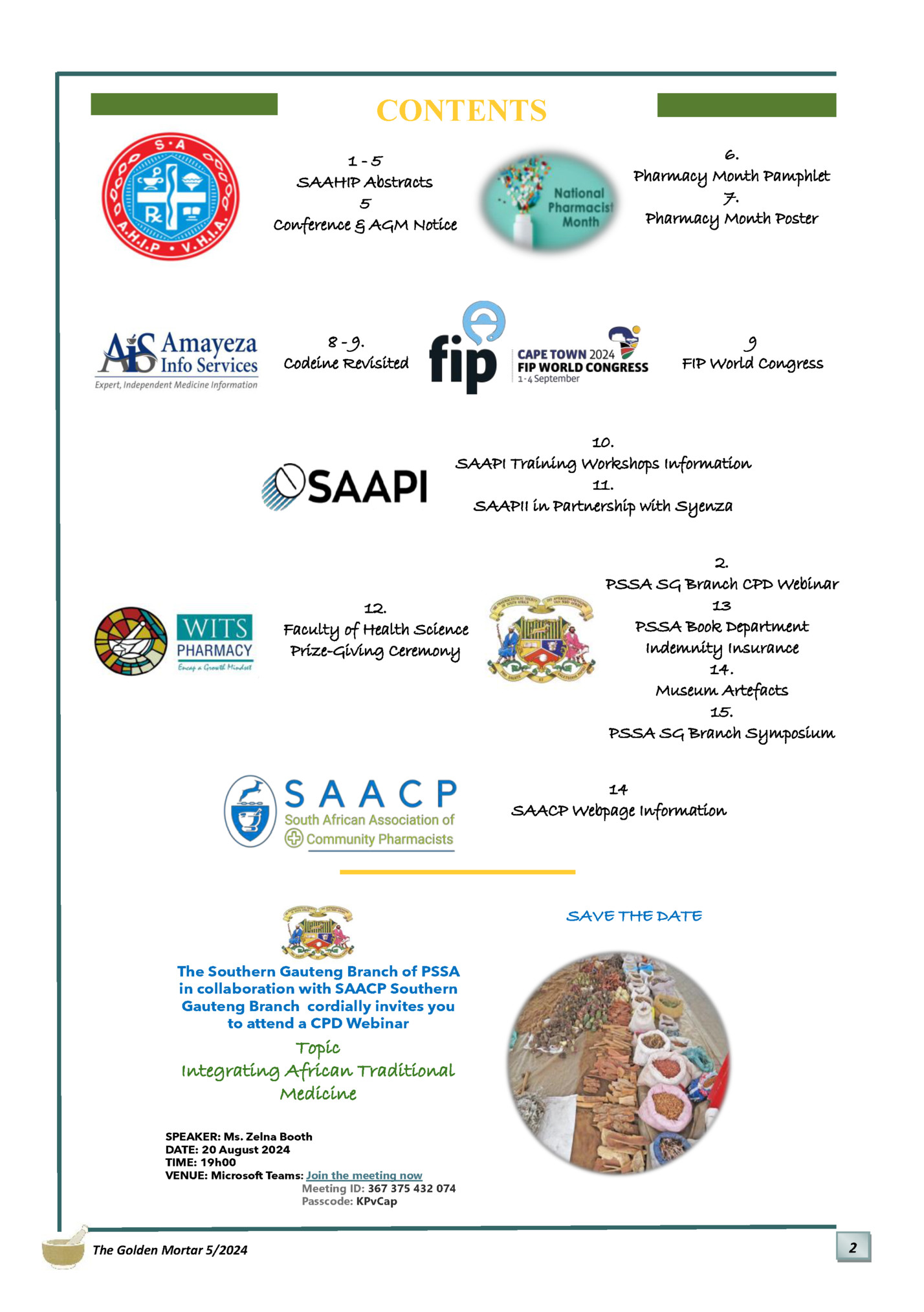
The transformation of the healthcare system through the utilisation of AI and big data must incorporate concepts of sustainability, human-centeredness, multi-disciplinary collaboration, patient-centeredness and “resilience”. At this pivotal stage, hospital pharmacy must lay the foundation to cement their essential roles. This conference will provide a platform to discuss the implications of the impending National Health Insurance for pharmacy practice in South Africa, and to envision the role of hospital pharmacists in this reformed healthcare system. Being a pharmacist in this new age means being adaptable. As AI takes over specific tasks, there is a growing need for intrinsically human skills, emotional intelligence, critical thinking, creativity, and collaboration will be more crucial than ever. Together, they create a synergy that optimizes healthcare outcomes while upholding the human touch in pharmaceutical care. Ensuring that AI's deployment is beneficial and ethical is a collective responsibility. From developers to policymakers, educators to end-users, we all play a role in shaping the trajectory of AI's impact on healthcare. Hospital pharmacists, as integral members of the healthcare team, play a crucial role in navigating this revolution and ensuring optimal patient care amidst rapid changes. We invite and encourage abstract submissions from all practising hospital and institutional pharmacists, community service pharmacists, pharmacist interns and academics. We also invite researchers, clinicians, pharmacists, educators, and other healthcare professionals to contribute their insights and expertise to this important discussion on the future of hospital pharmacy in the era of the fifth industrial revolution. Together, let us explore innovative solutions and best practices to ensure optimal patient care and pharmacy practice excellence. CATEGORIES FOR SUBMISSION OF ABSTRACTS Precision Medicine and Personalized Therapies: How will the integration of genomics, big data analytics, and artificial intelligence impact the development and administration of personalised treatments in hospital pharmacy? Digital Health Solutions: Explore the role of digital health technologies, such as telepharmacy, mobile applications, and electronic health records, in optimizing medication management, patient monitoring, healthcare delivery in hospitals and handling of medicine shortages. Pharmacy Automation and Robotics: Investigate the implementation of automation, robotics, and smart systems in pharmacy operations, including medication dispensing, inventory management, and compounding, and their potential to enhance efficiency and patient safety. Advanced Drug Delivery Systems: Discuss emerging drug delivery technologies, such as nanomedicine, implantable devices, and targeted drug delivery systems, and their implications for hospital pharmacy practice in terms of drug formulation, administration, and patient care. Ethical and Regulatory Considerations: Examine the ethical, legal, and regulatory challenges associated with the adoption of fifth industrial revolution technologies in hospital pharmacy, including data privacy, security, and compliance with industry standards and guidelines. NHI Readiness: Current and future strategies to navigate National Health Insurance in a South African context. Data Analytics and Predictive Modeling: Discuss how data analytics and predictive modeling can enhance medication management and patient outcomes. Telepharmacy and Remote Patient Monitoring: Delve into the opportunities and challenges of telepharmacy and remote patient monitoring in the era of virtual healthcare. Patient-Centered Care: Highlight strategies for delivering patient-centered care in an increasingly complex healthcare landscape. The above is by no means an exclusive list. Other topics may be worthy of presentation. PRESENTATION CATEGORIES Using the following categories, determine the most appropriate format for your presentation: • Podium presentations: A formal 10-minute oral presentation. A further five minutes will be allowed for discussion and to receive questions from the audience. A podium presentation is generally a structured research project with aims, methods, results and conclusions. …/ continued on page 4 The Golden Mortar 5/2024 3
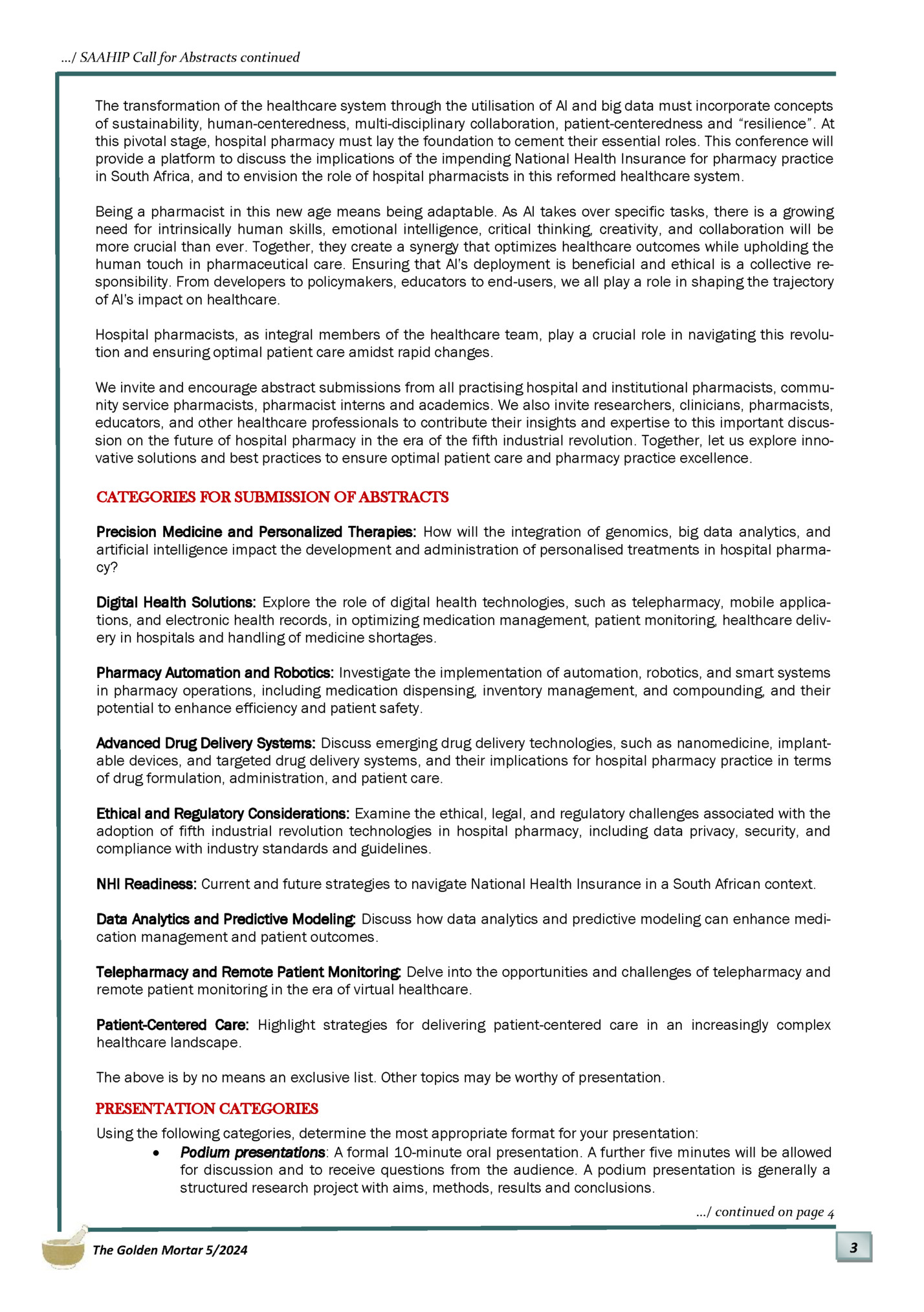
• • • Scenario presentations: A formal 10-minute oral presentation. A further five minutes will be allowed for discussion and to receive questions from the audience. A scenario could involve an in-depth study of a specific real-world event or a particular problem that was encountered and solved in a clinical or practice-related environment. Scenario presentations should illustrate a good understanding of why the event happened or why the problem occurred. Presentations should highlight the concerns that arise from a scenario (that requires further investigation) and how the problem can be solved. Pearl Presentations: A short five-minute oral presentation. "Pearls" are a fun-filled way of presenting a serious topic, but with a different slant. Just as a pearl has an intrinsic value, these presentations should focus on something exceptional, precious and not well known generally. The presentation should convey a useful, punchy message that has not been widely published or taught. The ideas could be from any practice setting, e.g. clinical, administrative, pharmaceutical care or quality improvement. Although both a title and an abstract will need to be submitted for the selection process, only the title will be published in the conference programme. This is to preserve the essence of a pearl presentation. No discussion will take place. Questions will not be invited from the audience. Poster Presentations: A visual display that facilitates discussion. A poster could be research, a case study or a real-life event as outlined in the scenario presentations above. Presenters can display their posters for three days and deliver a formal 2-3 minute talk to the full audience during the scheduled poster session. Discussion and questions from the audience will take place at the poster during the subsequent tea or lunch break. AWARDS The following awards will be presented: • Best podium presentation by a practising hospital or institutional pharmacist • Best poster presentation by practising hospital or institutional pharmacist • Best scenario presentation by a practising hospital institutional pharmacist • Best presentation by an academic pharmacist • Best pearl presentation Only paid-up SAAHIP members will qualify for awards. Award winners from the previous two conferences and members of the judging panel will not be eligible for an award. ABSTRACT SUBMISSION GUIDELINES Abstracts that do not comply with the following criteria will not be considered for acceptance: All abstracts will be reviewed by an abstract committee. The accepted abstracts will be assigned to appropriate poster-, oral-, or scenario sessions. A notification will be emailed to every corresponding author. Authors who then wish to present their abstract at the conference must send back the signed acceptance document and pay the registration fee. No honorarium, travel-, or accommodation expenses will be provided or covered for presenters. Layout for ALL abstract submissions: Abstract must be saved as a MS Word document (Not PDF) Font: Arial, regular font, size 10 Spacing: Leave a blank line between the main sections of the abstract, otherwise use single line spacing. Do not indent the start of a paragraph. Use full justification for text alignment. Title: Use bold font, and centre the title; the title should be brief and clearly indicate the topic of the presentation. Capitalise the first letter of each word as appropriate. Try to avoid the use of “A”, “An”, or “The” as the first word of the title. Authors and Affiliations: Use normal font and centre the text. Type the author’s surname first, followed by the initials. Underline the presenting author. Do not include titles or degrees. Only include the place of employment or institutional affiliation. Body of Abstract: The abstract should not exceed 350 words (word count excludes title, authors, affiliations, spaces, title notes). Avoid using tables, graphs or graphics in the abstract Abstracts for poster- and podium- presentations should be structured in the following format: • • • • Background Methods Results Conclusion …/ continued on page 5 The Golden Mortar 5/2024 4
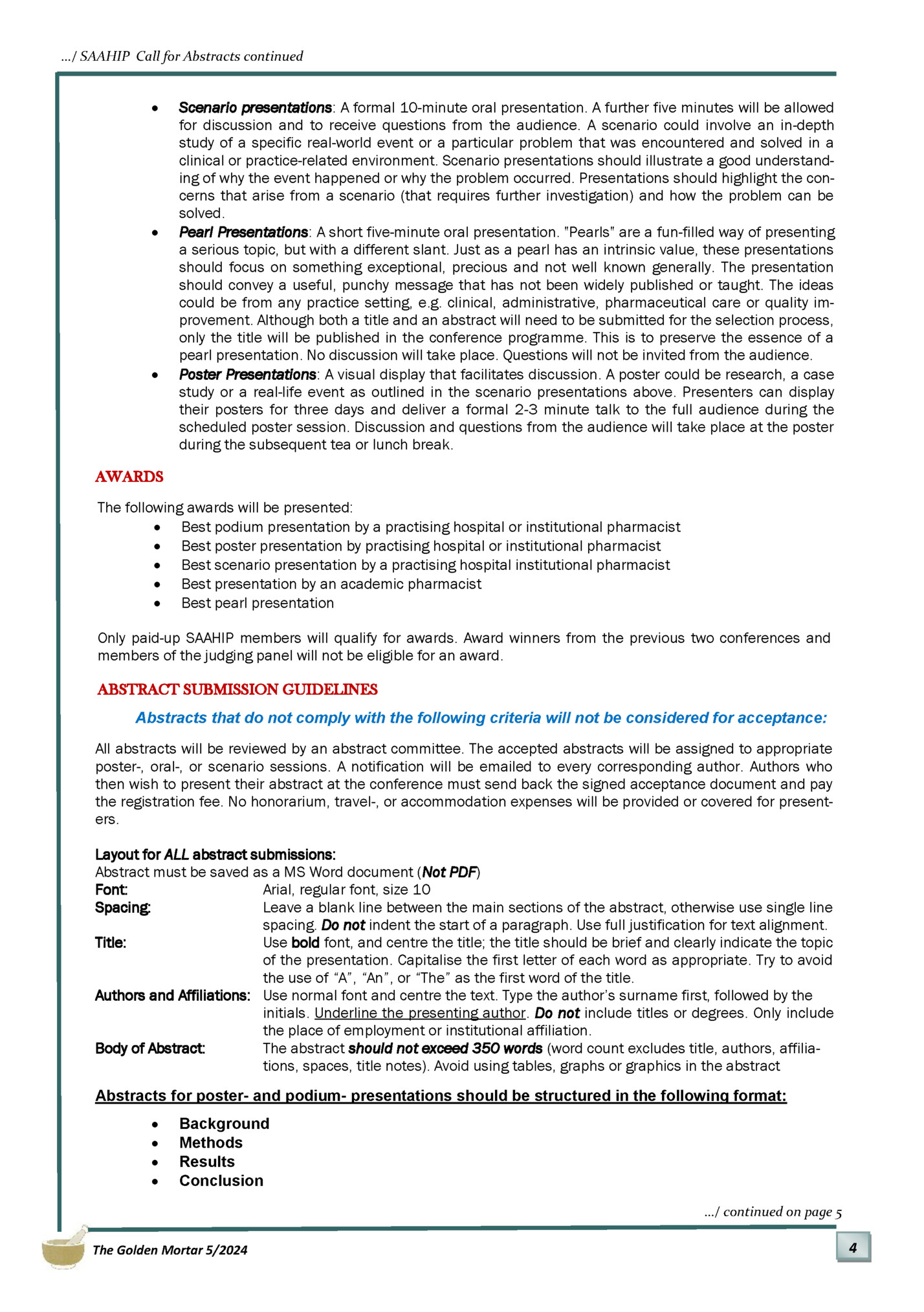
Abstracts for scenario presentations should be structured in the following format: • • • • • Setting / Background; Purpose of the project / Objectives / Description of case/event; Approach used; Results / Outcome of case/event; Lessons learnt / Key learning points. Abstracts can be submitted electronically by following the link: https://forms.gle/neZqAe6g9CvyEAXV7 For more information, you can send an email to: liezl.fourie14@gmail.com IMPORTANT DATES • Abstract submission deadline: 30th September 2024 • Notification of acceptance or rejection from the Academic Committee: 15th November 2024 SAAHIP CONFERENCE AND AGM The Golden Mortar 5/2024 5
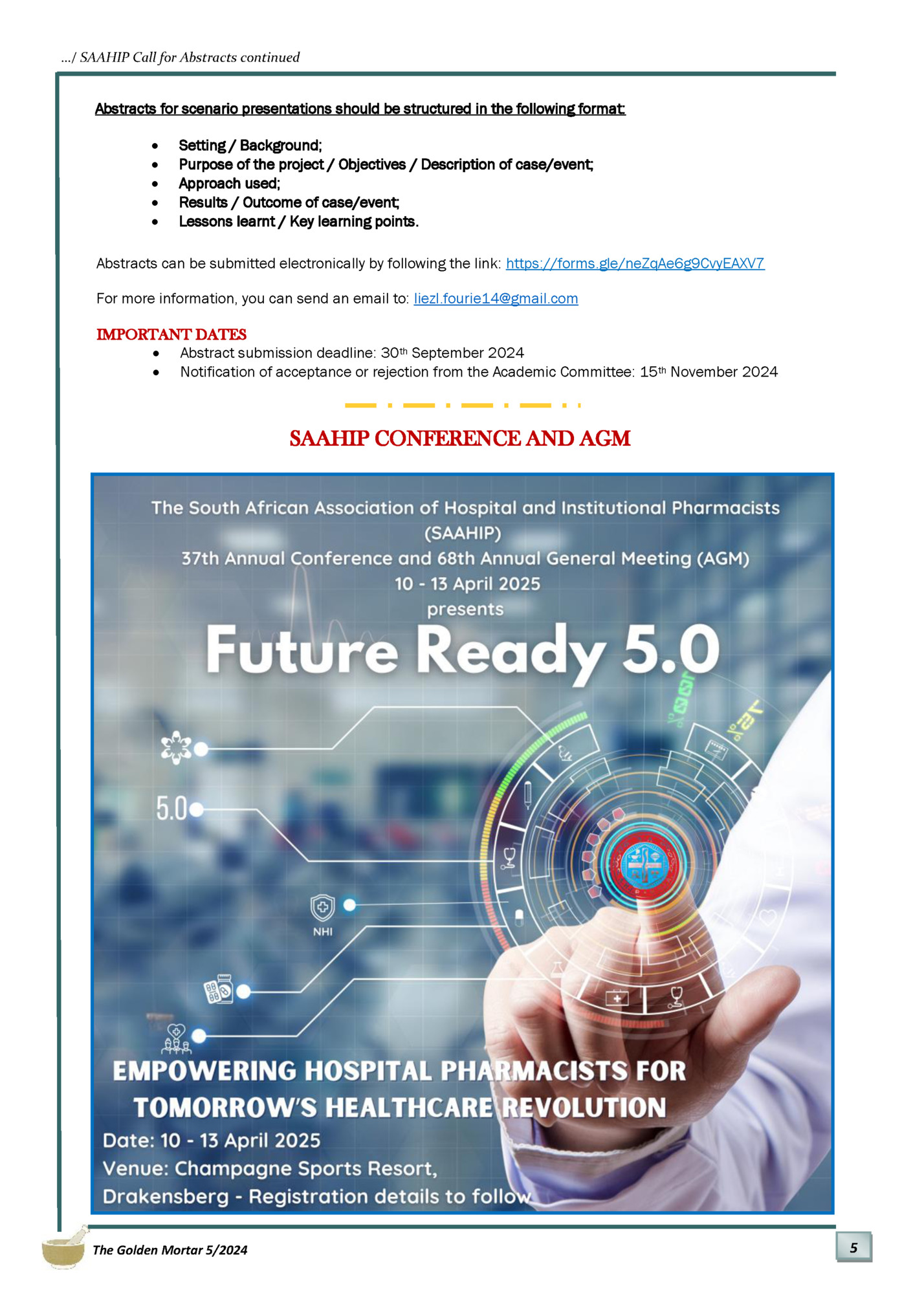
…/ continued on page 7 The Golden Mortar 5/2024 6
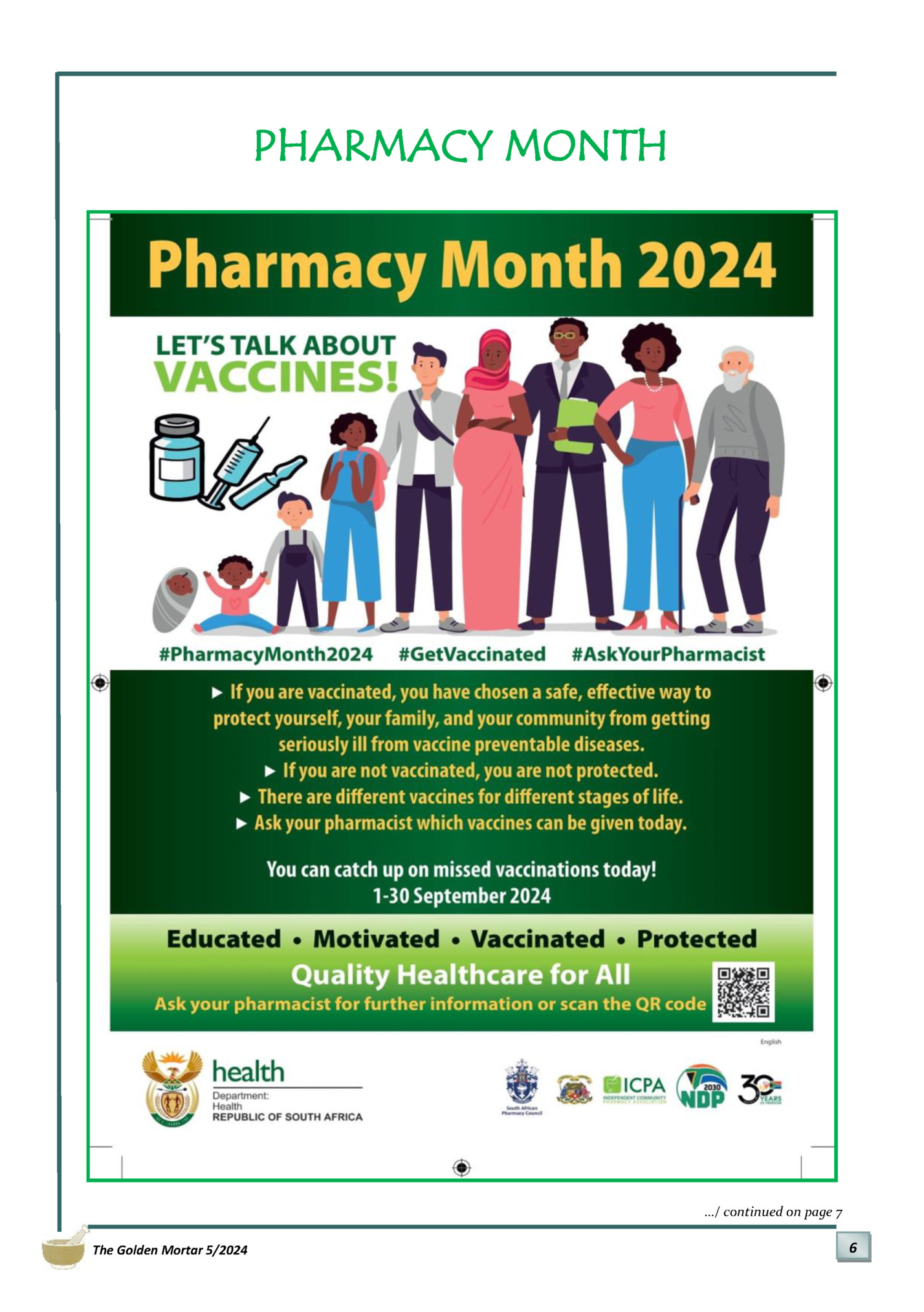
The Golden Mortar 5/2024 7
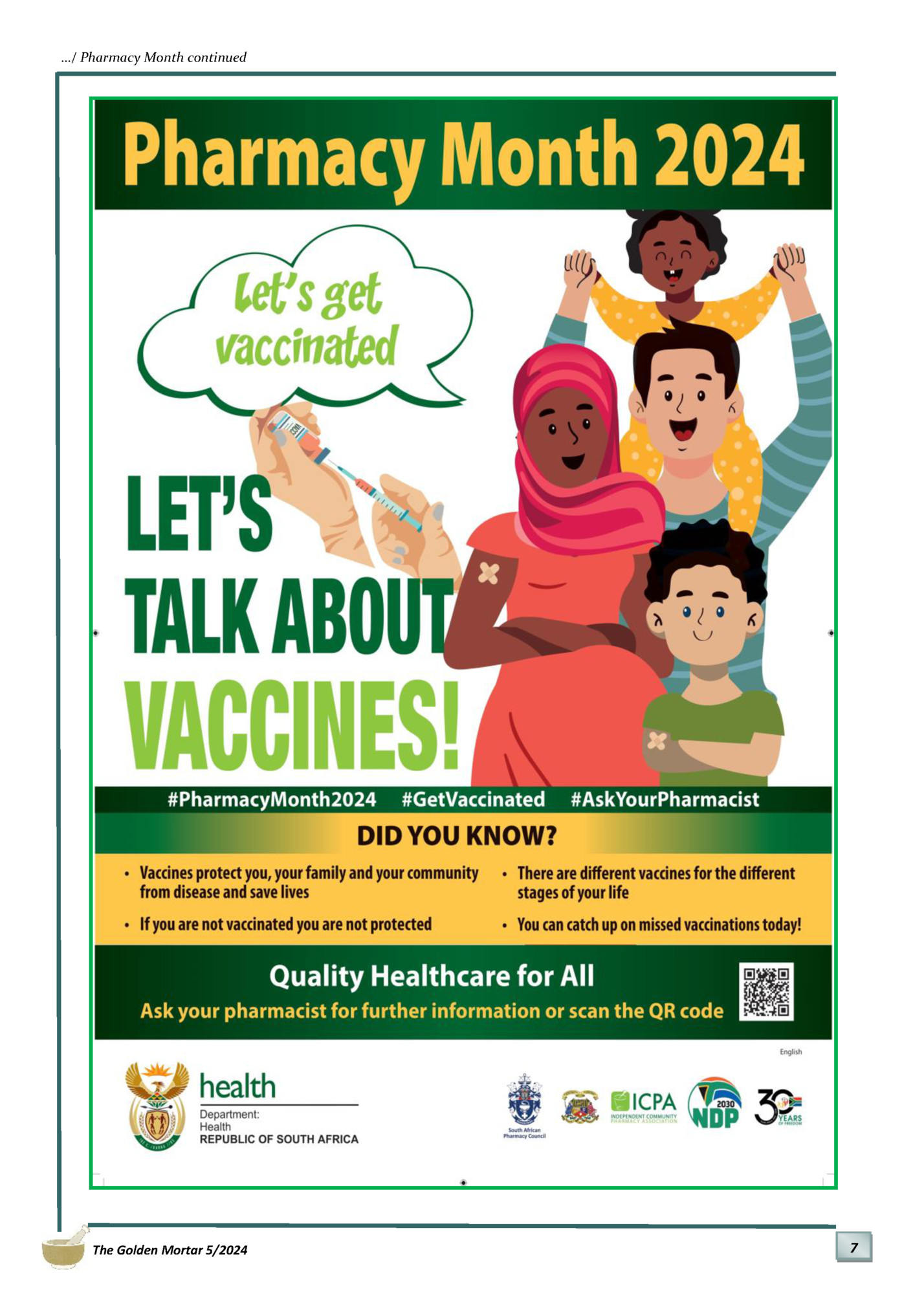
Amayeza Information Services Codeine Care Revisited Codeine (3-methylmorphine) belongs to the opioid class of medicines and is available overthe-counter (OTC) in South Africa in combination with other ingredients for analgesia or as an antitussive. Although used OTC for the management of mild to moderate acute pain, codeine’s use as a painkiller in this setting is debatable, as recent trials comparing it to common non-opioid medications were inconclusive. As a cough suppressant, dextromethorphan has been shown in some studies to be more effective than codeine. A perception exists that codeine is ‘safe’ because it is available without a prescription. However, the misuse of codeine -containing medicines is well documented. Codeine abuse, where codeine-containing cough syrups are mixed with soda drinks to get a high, has been popularised amongst teens influenced by their favourite rap artists. In a study investigating opioid sales of over-the-counter codeine-containing products in 31 countries over 6 years (from 2013-2019), the results showed that, of these countries, South Africa sold the most units per person. Frighteningly, approximately 5-8% of people in addiction facilities in South Africa reported primary or secondary addiction to codeine obtained over-thecounter. While many countries, such as Australia in 2018 and France in 2016, have reclassified codeine as prescription-only, South Africa remains one of the few countries where it is still available without a prescription. Codeine is an agonist at three opioid receptors (mu, delta and kappa), with a 20 times higher affinity at the mu receptor compared to the delta receptor, and a lesser selectivity for the kappa receptor. Approximately 10% of codeine is metabolised by CYP2D6 to morphine, which is responsible for its analgesic effect. Activation of the mu receptors in the midbrain is the main mechanism of opioid-induced analgesia. Genetic differences in the expression of this CYP2D6 enzyme may result in differences in the extent to which codeine is metabolised to morphine. A very interesting webinar presented by The South African Health Products Regulatory Authority (SAHPRA) as the first part of their revised Codeine Care Initiative (CCI) series, was held on the 10th July 2024, and may be accessed via the following link: https://www.sahpra.org.za/ event/cci-webinar-series-module-1-holistic-management-for-pain-cough-colds/ In this webinar, Dr Jacques Snyman explains that while the stimulation of the mu receptor by morphine is responsible for pain relief, other effects, such as euphoria, addiction and respiratory depression also occur, because of a stimulation of the same receptors. Stimulation of kappa receptors by morphine, is associated with pain relief (albeit to a lesser extent as compared with mu receptors) and is also associated with dysphoria and sedation. To quote Dr Snyman, “Pain is the antidote for opioid effects and side-effects, and as pain subsides, unwanted effects increase…..(effects) such as dysphoria, and nausea would increase as pain decreases.” He goes on to explain that pain is a good antidote for tolerance, and that if there is an absence of pain, the side-effects we see are increased. If codeine is abused for its euphoric effect, one will also see more of the other adverse effects. Interestingly, he explains that if a patient is using the opioid for a chronic pain condition, there is a lower likelihood for the development of tolerance, than when a patient is using it for an alternative effect, such as euphoria. Previously, when a voluntary Codeine Care Initiative (CCI) was launched in South Africa, it was not very well supported by pharmacists. However, the South African Health Products Regulatory Authority (SAHPRA) is drafting new guidelines where it may become mandatory for pharmacies, as well as health providers, to digitally record the ID numbers of patients purchasing codeine products into a centralised computer system. Manufacturers of codeine products, as well as wholesalers, would also be tracked in order to prevent illicit sales to unregistered outlets. …/ continued on page 9 The Golden Mortar 5/2024 8
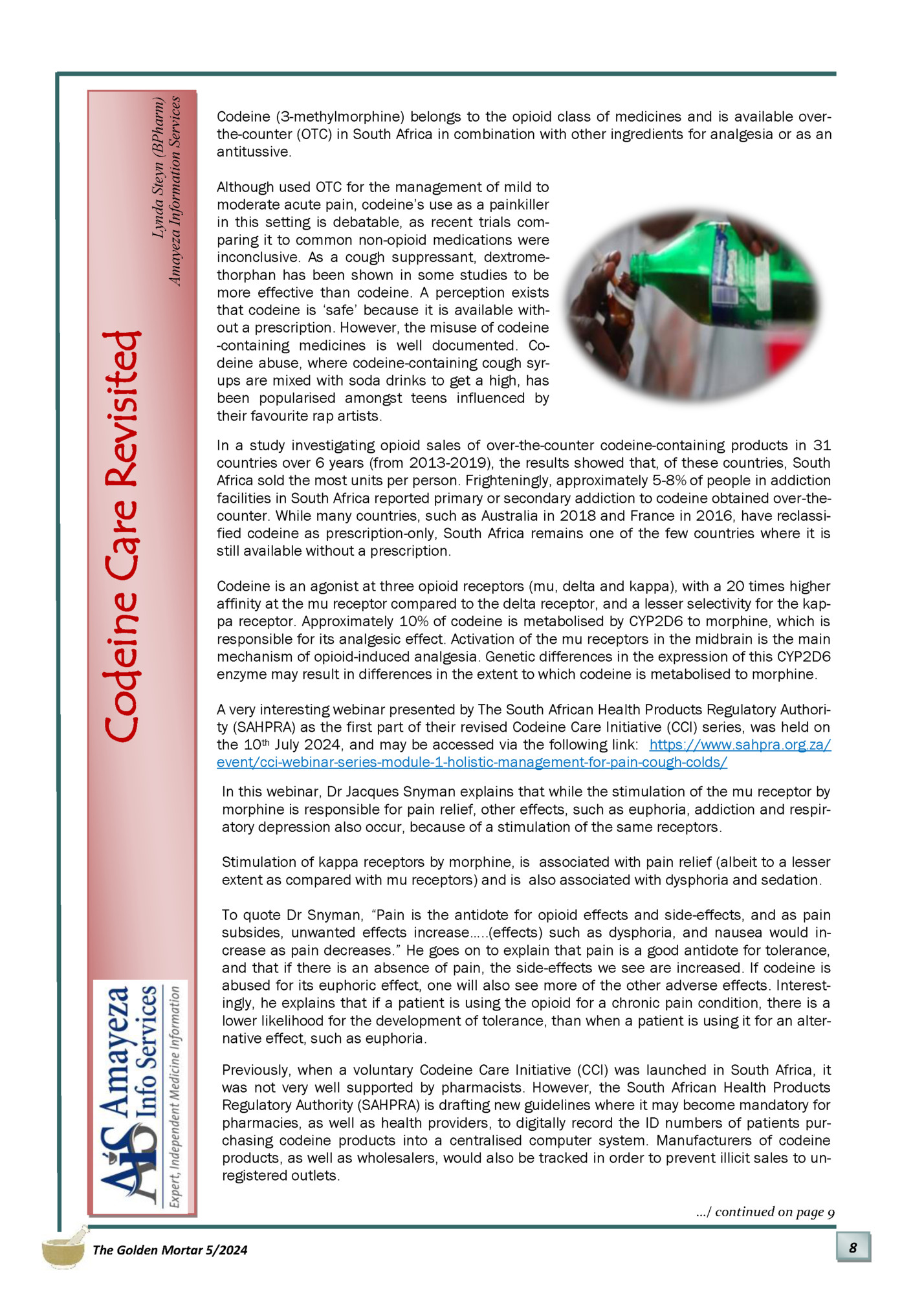
Many doctors are unaware of their patients’ over-the-counter use of codeine-containing products, and public health measures need to be put in place to ensure the safe use of these products. Patients need to be appropriately counselled about the potential for abuse, misuse and addiction when buying codeine products. Long-term users of codeine, who are physically dependent on codeine, may have withdrawal reactions if they abruptly stop taking codeine. Slow tapering of codeine is recommended for these patients. As pharmacists, we need to be properly trained in how to manage (or where to refer) a patient who is abusing or addicted to codeine. Hopefully, if codeine is not to be up-scheduled in the future, the new CCI will address several of these issues. BIBLIOGRAPHY 1. Richards GC, Aronson JK, MacKenna B, Goldacre B, Hobbs FDR, Heneghan C. Sales of Over-the-Counter Products Containing Codeine in 31 Countries, 2013-2019: A Retrospective Observational Study. Drug Saf. 2022;45(3):237-247. doi:10.1007/s40264-021-011432. SAPC. Pharmaciae. Medicine Misuse: Codeine. Available from : https://sapc.pharmaciae.org.za/medicinemisuse-codeine/ 3. Copelyn J. Spotlight. Codeine misuse: South Africa set to get new guidelines. Available from: https:// www.spotlightnsp.co.za/2024/05/02/codeine-misuse-south-africa-set-to-get-new-guidelines/ 4. The Stakeholders Forum on Codeine Care and Medicines with a potential for overuse, misuse and abuse. 28 Feb 2020. Available from: https://www.saacpsg.co.za/Downloads/INDUSTRY-PROPOSAL-FOR-THECONTROL-OF-SUPPLY-OF-CODEINE-CONTAINING-MEDICINES.pdf 5. Schellack N, Maimin J, Malan SF, et al. Navigating medication errors - an overview, and cautionary tales for Pharmacists. Pharmaciae. eVol17No1, August 2020 6. SAHPRA. Module 1: Holistic Management for pain, cough and colds. CCI Webinar Series. Available from: https://www.sahpra.org.za/event/cci-webinar-series-module-1-holistic-management-for-pain-cough-colds/ 82nd FIP WORLD CONGRESS OF PHARMACY AND PHARMACEUTICAL SCIENCES Cape Town, South Africa 1 – 4 September 2024 Supported by the Pharmaceutical Society of South Africa “Innovating for the future of healthcare” For more information, visit congress website: capetown2024.fip.org The Golden Mortar 5/2024 9
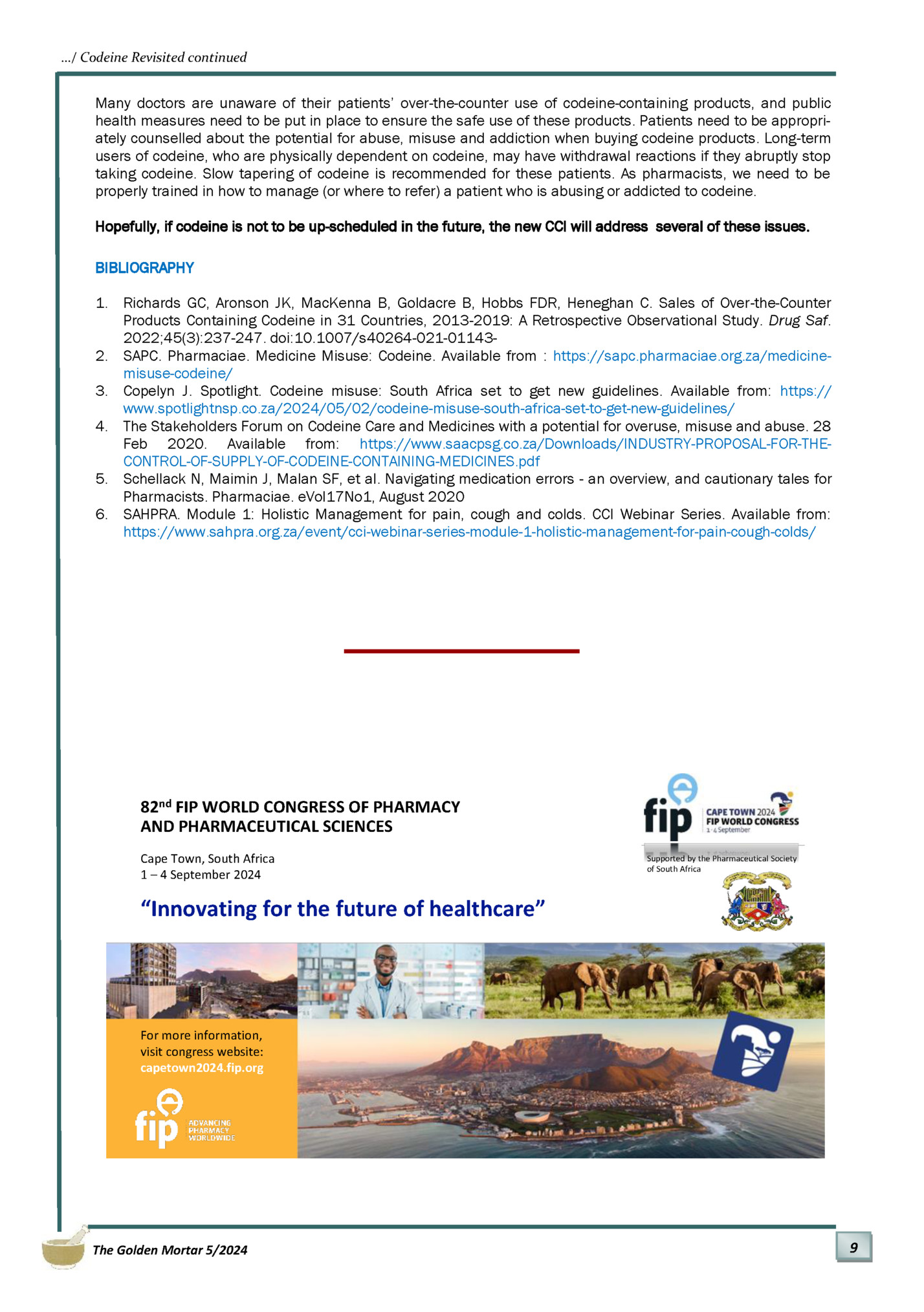
Fleepit Digital © 2021